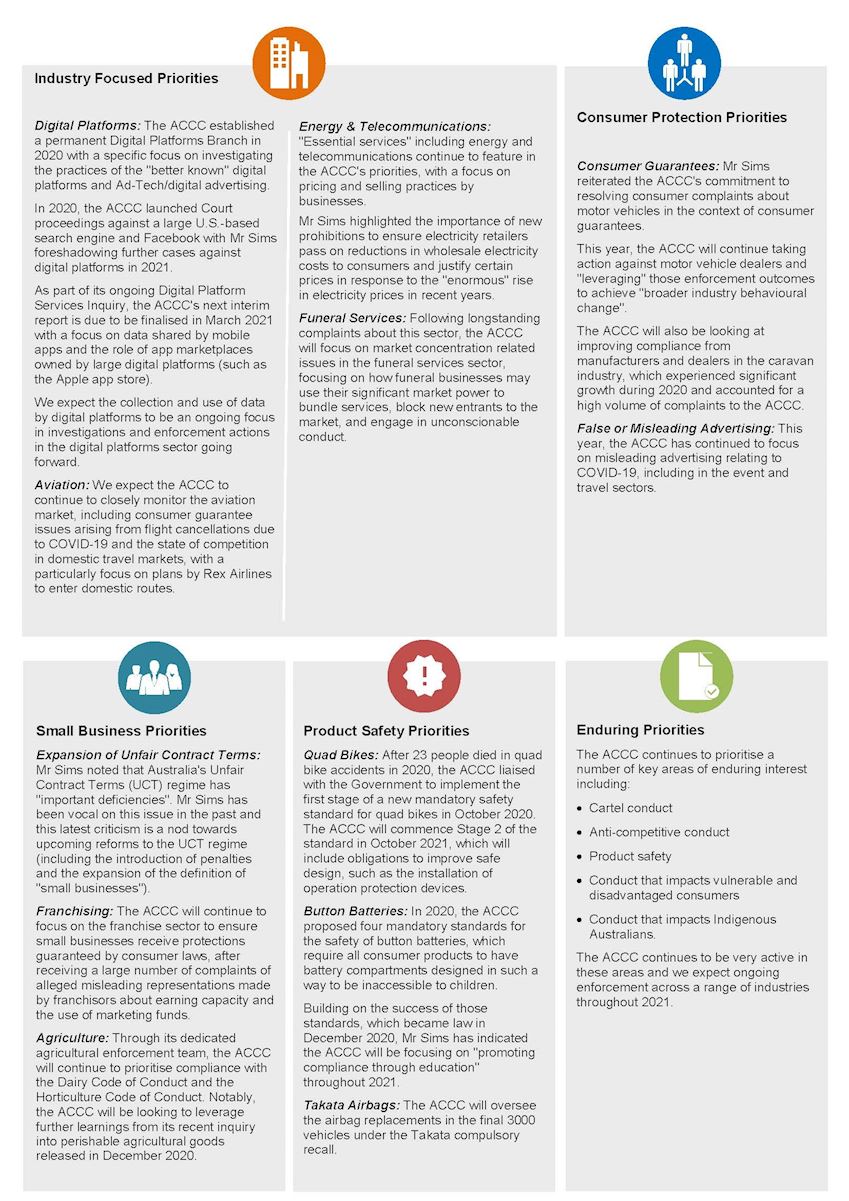Regulating the Economic Pie: Key Takeaways From the ACCC’s 2021 Enforcement Priorities
 6 Maret 2021
6 Maret 2021
In Brief
Australian Competition and Consumer Commission (ACCC) Chair, Rod Sims, has announced the ACCC’s 2021 compliance and enforcement policy and priorities. The focus of the ACCC’s 2021 priorities is reflective of its:
- continuation of its unfinished “to do” list in a COVID-19 interrupted 2020
- enduring/ongoing priorities, such as the prosecution of cartel conduct (with two to three prosecutions foreshadowed to commence in 2021)
- pursuit of its recently emerged enforcement focus on digital platforms and strengthening protections for small businesses.
Key updates include:
- continuing to advocate for reforms to address key issues impacting consumers and small businesses:
- reiterating the need for the prohibition (and penalties) for unfair contract terms and renewing calls for a prohibition against “unfair trading practices”
- continuing its focus on consumer guarantees issues, particularly for high value goods, including motor vehicles and caravans, together with “hinting” at a future push for the prohibition for non-compliance by suppliers with the consumer guarantees in the Australian Consumer Law
- ongoing enforcement in the franchise space
- renewed focus on competition and consumer law issues related to COVID-19, including in the aviation, travel and events sectors
- further enforcement actions against digital platforms and in the energy and commercial construction sectors
- proposals to change and rebalance Australia’s merger laws.
More Detailed Observations on the ACCC’s 2021 Priorities
.jpg)
Takeaways
The ACCC is seeking to strike a balance between continuing its “unfinished business” in the form of 2020 priorities that were cast aside due to the COVID-19 pandemic, and its new focus areas in 2021.
Mr Sims’ reference to continued action on COVID-19 specific issues, in particular the travel industry, indicates that Australia is “not yet out of the woods” and COVID-19 consumer and competition issues (particularly for the aviation industry) will remain firmly in the ACCC’s targets.
Another key takeaway from Mr Sims’ speech was the overarching themes of law reform and the ACCC’s commitment to pursuing enforcement actions in the “public interest”. Mr Sims is aggressively advocating for law reform:
- He called for the introduction of an “unfair trading practice” prohibition. This provision would seek to capture conduct that is detrimental to consumers which may fall short of existing unconscionable conduct or UCT laws.
- Mr Sims also announced that the ACCC will be pursuing merger law reform options in 2021 in light of the ACCC’s view about Australia’s merger control regime being “skewed towards clearance”. In particular, the ACCC holds concerns about the difficulties associated with assessing what will happen in the future without the merger (the counterfactual) and insufficient weight being given to the risks to competition (including competition lost, barriers to entry being raised and competitors foreclosed).
With respect to enforcement actions being pursued in the public interest:
- Mr Sims acknowledged the ACCC’s recent losses in court against Kimberly-Clark and Jayco Caravans but reaffirmed the ACCC’s commitment to taking on cases which it believes are in the public interest. We anticipate that the ACCC will continue to pursue court actions where an area of law may be untested or if a set of facts poses novel questions about the applicability of the law.
- Mr Sims made reference to the ACCC’s case against Lorna Jane alleging false or misleading claims with respect to its “Anti-virus Activewear”. While it was acknowledged that these issues also sit within the realm of responsibility of the Therapeutic Goods Administration, the ACCC considered there to be a “significant public interest” in this case being pursued under the Australian Consumer Law. In the COVID-19 era and beyond, we would continue to caution businesses against assuming that a regulator other than the ACCC may deal with an issue if the subject matter also falls within the broad scope of competition and consumer laws.
All in all, 2021 is shaping up to be a notable year for the ACCC, small businesses and large companies alike.
